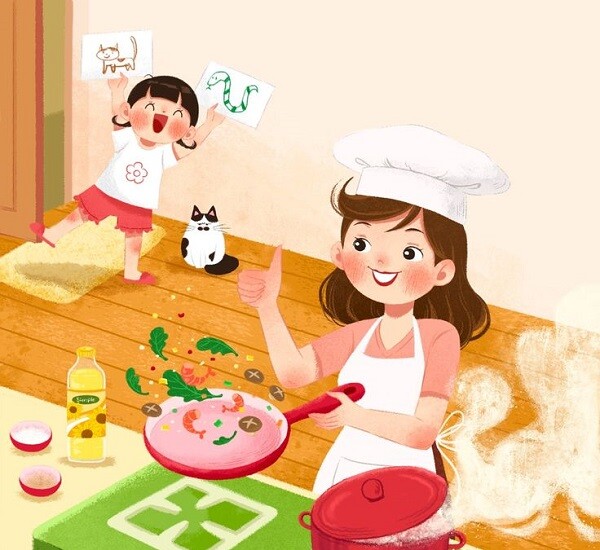A mother scolds and hits her son for not doing his writing homework: “I told you to obey me and do your homework immediately!”
Initially, the boy cries from the scolding and hitting. Then, he starts to fight back, and neither backs down.
This story reminds us of the “Hercules Effect” in psychology.
The tale goes that a strong man named Hercules stumbled upon an inflated bag. In his anger, he stomped on the bag, but to his surprise, it only inflated further, obstructing his path.

Hercules’ behavior mirrors that of parents who “fight” their children’s issues head-on, trying to conquer them at all costs. As a result, the child becomes like an inflated bag, with a “spring-like” resistance.
In reality, if parents resort to power to oppress their children, the children have no choice but to fight back.
As psychologist Huang Shiming once said, children are loving and obedient by nature. However, they are more willing to follow guidance when they feel the bond of love and respect.
Indeed, instead of forcing children to always be “ready for battle” with “force,” parents should use “gentleness” to disarm their children and guide them towards maturity.
There’s a saying that goes, “Education is like iron, but when poured over a child’s head, it becomes as weak as water. However, when allowed to seep into a child’s heart, it becomes as strong and powerful as iron.”
Education is never a competition but a journey taken together. Thus, parents should also be more flexible in their daily lives, fostering positive growth in their children.

Use a softer tone when communicating with children
A mother, whose white walls were vandalized by her son’s doodles, advises him:
“Wall paintings require special brushes to look good. You should practice with color pens in your notebook first. When you improve, I’ll buy you a special brush, and you can paint on the walls as you wish.”
The child, upset, replies: “I want that brush now.”
The mother, instead of getting angry, remains calm and says: “There are only so many walls in the house. Do you want to save the best painting for the last wall or paint now, but it won’t look as good?”
The child falls silent for a moment, then obediently takes his notebook and starts drawing.

Use a softer tone when communicating with children.
When educating children, “how you say it” is often more important than “what you say.” The mother skillfully used her words to help her child understand that creating a beautiful painting takes time and preparation. Instead of criticizing or immediately rejecting his desire, she opened a dialogue, helping him realize the value of practice and patience.
When parents speak gently and teach gently, they are less likely to fall into an emotional confrontation. This approach helps children feel respected, creating a safe environment for them to express their emotions and thoughts. Instead of feeling pressured, children are more comfortable sharing their desires and dreams.
Educating children is not just about imparting knowledge but also about fostering positive thinking habits and self-confidence. When children feel heard and valued, they are more likely to engage actively in learning and self-improvement.

With a gentle attitude, respected children will make reasonable choices
Deng Yaping’s son was addicted to online games and determined to pursue a career as a professional gamer. While concerned, Deng Yaping did not use violence to stop him. Instead, he expressed respect and support: “It’s not bad to aim for a championship in gaming.”
To help his son achieve this goal, Deng Yaping took him to a gaming sports club weekly, allowing him to understand the training process and habits of professional gamers. He spent time communicating, listening to his son’s thoughts and emotions. He shared his own experiences, both successes and failures, so his son understood that the path to success is never easy. He let his son make decisions, encouraging him to think carefully about his dreams and the sacrifices necessary to pursue them.
As a result, after careful consideration, his son decided to give up the path of becoming a professional gamer. This decision was not a surrender but an important step in his maturity. He learned that pursuing a passion requires self-knowledge and an understanding of genuine life values.

With a gentle attitude, respected children will make reasonable choices.
There’s a saying: “If you can only give your child one thing, let it be respect.” Respect is the foundation of education. When children feel respected and understood, they are motivated to grow and explore new paths.
In this environment, children don’t feel the need to fight for power or win at all costs. Instead, they learn to communicate, express their emotions, and make decisions based on confidence and responsibility.
Respect is not just about listening but also about taking concrete actions, such as creating a safe space for children to express their thoughts and emotions without judgment. This helps children develop social and emotional skills and form positive relationships with others.
In doing so, Deng Yaping not only educated his son about gaming but also imparted valuable life lessons. His son learned to face failures, find his true passion, and develop the necessary skills to succeed in the future, whether in esports or any other field.
Ultimately, respect and understanding in education not only foster a strong bond between parents and children but also help children become independent, thoughtful individuals who act based on their values. This foundation will serve them throughout their lives, giving them the confidence to embrace new challenges and grow into responsible, successful adults.

Acting gently encourages children to cooperate
In the show “Don’t Underestimate Me,” guest Fu Seoul is tasked with helping a child named Lei Lei complete a mountain-climbing challenge. However, at the foot of the mountain, Lei Lei loses his temper and refuses to climb further. The pressure and anxiety of facing a significant challenge cause him to hesitate, and negative thoughts start swirling in his head.
At this point, Fu Seoul doesn’t give in to Lei Lei’s demands but sits on the ground and shouts: “If we can’t walk, let’s crawl!” This unexpected act breaks the tense atmosphere. Lei Lei is so startled by this display that he immediately stops crying and urges Fu Seoul to get up and climb. His emotions shift from fear to determination as he realizes he’s not alone in facing this challenge.
But no matter how hard Lei Lei pulls, Fu Seoul remains still, feigning weakness and saying: “I can’t take it anymore; I’m too tired. Can you help me carry my bag?” This not only shows humility but also evokes a sense of responsibility in Lei Lei. He eventually promises to stop making a fuss.

Acting gently encourages children to cooperate.
In the subsequent climb, Lei Lei becomes more and more energetic and charges ahead. The feeling of leading and helping an adult gives him confidence. This shows that sometimes, appropriately displaying weakness can greatly motivate children, making them feel valued and important.
Thus, problem-solving becomes easier when we appropriately show weakness and compromise, as children are more willing to obey. In fact, a parent’s humility is the most irresistible gentleness to a child.
When parents allow themselves to be vulnerable and express their emotions, children feel safer to share their fears and worries.
Moreover, the lesson from the mountain-climbing challenge isn’t just about conquering the peak but also about Lei Lei’s personal growth. He learns to face challenges and understands that support from others can help overcome fear. When children feel respected and accompanied, they are more likely to find the motivation to move forward, even when the path ahead is difficult.


































